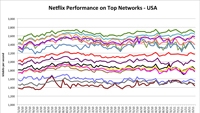Netflix rates ISP performance

Netflix, one of the nation’s largest distributors of online movies, has recently begun rating the performance of the ISPs that deliver the video stream to its end users.
In an item on the Netflix blog, Ken Florance, the company’s director of content delivery, said Netflix is in the unique position of having insight into the performance of hundreds of millions of long-duration, HD video streams delivered over the Internet.
“The throughput we are able to achieve with these streams can tell us a great deal about the actual capacity our subscribers are able to sustain to their homes,” he wrote. “We’re using a time-weighted bit rate metric to represent the effective data throughput our subscribers receive over many of the top ISPs.”
Currently, he said, the top HD streams are about 4800kb/s.
“Clients may switch through a number of bit rates as they ramp up to the highest stream or shift down from the highest stream if they cannot sustain play at that rate due to throughput constraints,” Florance wrote. “No client would sustain a 4800(kb/s) stream from start to finish. But the higher the sustained average, the greater the throughput the client can achieve, and the greater the image quality over the duration of the play.”
Many Netflix clients, he said, can adapt to changing network conditions by selecting the network path that’s currently giving them the best throughput. In the metric (see figure), Netflix is filtering for titles that have HD streams available and for devices capable of playing HD streams, which also filters out mobile networks, to highlight what’s achievable in terms of HD performance on the various ISP networks.
Currently, Charter Communications, the fourth largest provider in the United States, leads for streaming with 2667kb/s average over the period; it serves more than 4.7 million customers in 25 states. Rogers leads in Canada with a 3020kb/s average.
Get the TV Tech Newsletter
The professional video industry's #1 source for news, trends and product and tech information. Sign up below.
